September 7th, 2010 · 1 Comment
… So far.
During the two weeks in London, I have so far had the opportunity to see a variety of shows, which have offered different perspectives of theatre culture in England.
First, there was The Merry Wives of Windsor at The Globe. As a groundling after a long day exploring the city, my feet were exhausted by my excitement levels were through the sky (well, higher than usual, as they tend to be at somewhat extreme heights in general). Seeing Shakespeare performed at The Globe was an incredible experience for many reasons. Not only was the performance one of the best live productions that I have seen, the theatre’s atmosphere was almost indescribable. It was almost if everyone had traveled to the turn of the 17th century. Usually, everyone is quiet during the performance and politely respectful of the performers. While this was the case, the audience seemed more willing to shout, cheer, and laugh uncontrollably at the events on stage. Being so close to the stage, the magic of the actors radiated from the stage and created an atmosphere unmatched by any performance thus far. The added music also added to the atmosphere- an Early Modern theatrical experience would have had the pre-show performers and would have been completely different from what we are used to. The performance was as close to replicating that experience as possible in our modern world. Afterwards, we were able to thank some of the actors and they seemed sincerely grateful that we said something- an idea that would be challenged later.

Next came the Proms at Royal Albert Hall. While The Globe was magical, Proms was one of the most equalizing of the performances because of how accessible they were. In the States, every classical concert I have been to has been a stuffy affair. There, the celebration of the music was open and everyone seemed to be unified in their desire for good music (which the audience should not have been disappointed with). The biggest issue I had with the Proms was the incessant coughing. Usually people try to hold their coughs, but when one or two people cough at during movements, it doesn’t provide an excuse for everyone to cough uncontrollably to prove they can and that they are not going to do disrespect the musicians by coughing during the performance. I would like to go back to Proms to see if it is a bizarre tradition or if that night was a fluke.
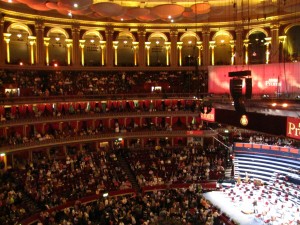
Royal Albert Hall
My following experience was Billy Elliot, which I have already blogged about, so I’ll try not to be redundant here. Other than being my first big West End experience, it was also important because it showed a lot of the themes of our course in a new light. Instead of applying the themes to the immigrant communities, it showed the themes in terms of a distinctively native English story. Furthermore, it also highlighted two differences between English and American theatre in particular. Firstly, we aren’t used to paying for our programs in the States. As an avid theatre goer, I’m used to being handed a Playbill (or regional equivalent) and continuing into the theatre. I don’t have to wonder who the cute guy playing a certain character is or why so and so looks so familiar. I don’t mind paying an extra three quid when I’m paying half of what I’m used to paying, but it definitely caught me off guard. Secondly, the tradition of stage door here is (as far as I’ve gathered) practically non-existent. In NYC, it is fairly common to wait after the show at the stage door to thank the actors for their performance, get an autograph, and if you are lucky, a photograph. (Yes, this can be a weird experience, but it can also be a great one.) When we went after Billy, it was completely different. While there were people there, the actors went by ignoring everyone. After Holly mentioned it, I realized that this was indeed a representation of the English concern for privacy and social dis-ease. On stage, the actors are free from interacting with the strangers feet away from them. At the door, they are in a different type of spotlight. Yet, the boundaries between personal and private life would not intersect. They are still technically at work. The guys from The Globe seemed to enjoy that we acknowledged them. I can’t wait to try another stage door experience to see the difference. (I planned to try again after Les Mis, but it was raining…)

The Victoria Palace, Home of Billy Elliot
Next came Bedlam, back at The Globe. For the first play by a woman performed there, the show was interesting. I’d like to say it succeeded it my expectations (which weren’t that high), but it didn’t. It did meet them, but something about the show was lacking the magic of the first show we saw there. At the end of the first act, I wasn’t at all satisfied, but by the end of the second, it had redeemed itself. I’d like to blame this all on not being a groundling and therefore surrounded by the audience members and the actors. I did enjoy it but it was not my favorite by any stretch.

The Globe, A View From Above
Lastly (thus far) is Les Miserables. One of my favorite musicals, I thoroughly enjoyed it. Despite the fact Marius has a slight bald patch, the actors were outstanding. (Even Norm Lewis, who I have seen in another musical and was THOROUGHLY disappointed in then, was outstanding. His awkward- but commanding- stage presence was perfect for Javert.) A truly equalizing musical, I was not surprised to see people in blue jeans and others in formal dresses. The difference is interesting when considered in the context of the musical and its equalizing themes. Theatre in London is truly for everyone- no matter one’s status. Seeing the opposites in dress at this show hit me as strangely appropriate. (I don’t want to elaborate knowing that some of you guys have yet to see it. So, I’ll just leave it at that.)
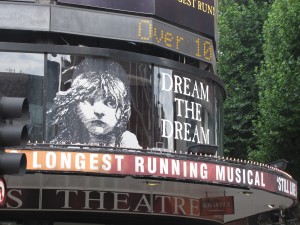
So far, I’ve thoroughly enjoyed my experiences at the theatre and can’t wait for more. I’m hoping to see Wicked (my favorite, in case you have missed that slight detail) and Blood Brothers at the very least. While technically not theatrical, I also expect my experiences at the various football matches I’m planning on going to to be worthy of a theatre stage!

Tags: 2010 Stephenie · Theatre
September 14th, 2009 · 2 Comments
I had the chance to attend the Feminist Literature tour in which I not only learned about women writers who resided in the Bloomsbury area, but also on how spaces affect who we are and everything that we do. I am intrigued with this notion. Recently I posted a blog on space, specifically focused on sacred/holy spaces, in this blog I will look back and focus on a few others others.
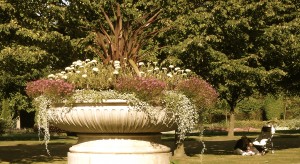
Green Green GREEN
Spaces of recreation, golden flowers and perfectly trimmed grass is what I think of. It is impressive to me how well kept they are. When we visited Regent’s Park during class for the first time, I was at a loss of words, for I had never in my life seen a space so beautiful. William Blake captures this beauty in his poem titled “The Lily:”
The modest Rose puts forth a thorn,
The humble sheep a threat’ning horn:
While the Lily white shall in love delight,
Nor a thorn nor a threat stain her beauty bright.
Regent’s Park could not be touched, human hands could never be gently enough to handle a flower’s delicate body. So untouchable, the flowers arranged almost to perfection. Ralph Waldo Emmerson once said that “Earth laughs in flowers,” and I believe him.
Hyde Park, almost as magical, but words cannot capture the immensity of this park. The amount of green that surrounds you at any given moment is difficult to describe. This park in particular serves as more than just a space for recreation, it is also a place where history is preserved, where various neighborhoods unite and where kids grow up to later bring their own kids to play at Kensington Gardens or near the lake. Green Park, a sort of gateway to Buckingham Palace (if you get off at the Green Park Tube station), can never be compared to Hyde Park for it lacks in immensity. Even though the deck chairs are a nice touch to the park, the area I visited lacked some color (as in floral color); I was not impressed. (Buckingham Palace itself was not very impressive. I was surprise to discover that it actually isn’t an enormous, glorious and royal-looking mansion… I guess it’s a good thing that it isn’t after all!)
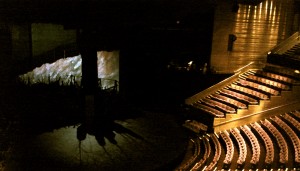
Let’s start the show!!!
Sometimes walking in for the first time takes my breath away, and sometimes the shows blows my mind, other times the idea of sitting there makes me wonder… wow. The three different halls of at the National Theatre, The Globe, Duke of York’s, the Phoenix and last but not least Royal Albert Hall! So here’s the list: “Troilus and Cressida,” “Arcadia,” “All’s Well That Ends Well,” “As You Like It,” “Pitmen Painters” and the not-so awesome musical “Blood Brothers,” oh and the amazing violin concerto at the Royal Albert. In London, I am never too far from New York City’s Broadway experience! The difference, the London experience always feels fulfilling no matter how horrible the play was. This is probably because Broadway shows are not exactly affordable, and while the National Theatre insists on having a wide range of prices (so that everyone can enjoy the theatre), Broadway just seeks revenue and to maintain it’s current status and popularity. I mean, to have Rick Fisher (who by the way is a Dickinson alum), winner of of a Tonny award, come to speak to us about his thoughts and experiences with London’s theatre scene, that within itself was enough to top all of the Broadway shows I have seen in my life! I <3 the London theatre experience!
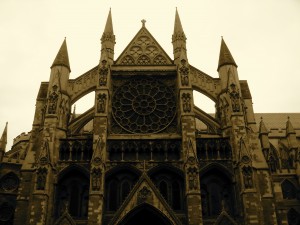
Religious spaces.
Intricate architecture, imagination, creativity and grace is what comes to mind when I think of churches. I’ve written a blog about them but I wanted to look back at a few of them. Westminster, ridiculously sacred, marvelous, immense and glorious. The same can be said about St. Paul’s Cathedral and the Hindu Temple we visited. At Brixton (where I directed a tour along with my teammates), I learned that religious spaces play a huge role in the community, one that extends beyond any religious affiliations. One specific church we visited during our research, Corpus Christi Roman Catholic church was involved in the reconstruction of the Brixton area after the Brixton riots, when parts of the neighborhood where damaged/destroyed due to violent protests. It always brings joy to my heart when people come together to help each other, regardless of any religious/cultural boundaries.

Clubs NOT Pubs
Ooooh pubs…. I’ve heard that you can see London’s history evolve in these spaces, and although they are known as spaces of leisure and social interaction their walls can tell unknown stories of both know and unknown visitors. I am always intrigued by pubs, so intrigued I am intimidated by them. I now that sounds a little ridiculous but in pubs I feel pressured to consume alcohol (after all that is the main purpose of a pub: to provide alcoholic beverages) and to maintain conversation when really all I want to do is dance to the awesome music playing in the background. Rebbeca (who along with 4 others constructed a tour of London’s historic pubs) has attempted to both enlighten me as well as persuade me to engage in pub culture, but I have yet to fully explore the wonderful world of London’s historic pubs.
Clubs, on the other hand, I’ve also had a difficult time with. I’ve realized that there isn’t much dancing that goes on, but rather an attempt to dance, which actually means jumping around to Lady Gaga’s “Just Dance” (pop/techno song). Over all, I have enjoyed late hip hop nights at Metra (dance club a few street corners off the Leichester Square tube stop) only because I have shared that space with amazing people who can turn any floor into a dance floor. (Thanks Anthony, Jeyla and Patsy!)
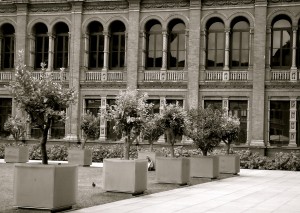
Spaces, our everyday living takes place within them, whether they are churches, clubs, parks or theaters. We lack to realize their importance, we never stop to think of how a room may affect how we feel about ourselves and about the rest of society. A room can change our lives, like the reading room at the British Museum that the feminist writers group spoke of on their tour. This room clearly changed Virginia’s Wolf literature, among other authors, I’m sure.
Note to self: Whether this room is physical or mental, it is important. We must take more time to appreciate a rooms ability to change the way we exist in our own individual worlds.
The End.
Tags: Flow · Uncategorized
September 11th, 2009 · 1 Comment
The beauty hit us.
Like waves against
the stones of the shore upon which the fiddler, the architect, played.
It gave way to
whimsical
terror
and with each turn
of a page or corner,
we discovered that
only a new anguished horror awaited us.
Variably, precision melted,
moaned away
into l e g a t o s l u r s
of
terse
vibrations
and
amorphous design. The crashing dissonance hit us,
poured over us and into our eyes and ears,
unwinding the tendrils
of muscle which control
perception and jamming
the cogs
which regulate a finely-tuned, mechanical reality.
Amidst the breakdown stood a man. He stood
alone, crazed and removed
and moving
erratically, creating
buildings and music and life in the midst of chaos.
This sound, this place, is chaos.
Can sound not be
[a place]
? We were told that art is. How can you argue that
this is not art?
Tags: Anya · Museums
September 10th, 2009 · 1 Comment
I have no idea what I’m talking about when it comes to classical music, nor do I have a musically creative bone in my body. I can pick out the right-hand parts to a few Beatles and Coldplay tunes on the piano and I can play a pretty mean kazoo, but my incompetence with the finer, mechanical parts of music has never kept me from deeply appreciating it. I’ll actually make sacrifices and bad life-choices I usually wouldn’t make to go see a live show, and I was very much looking forward to seeing Prom 70 at the Royal Albert Hall despite my almost complete ignorance of classical music.
I’ll admit that I was more excited to see anything in the Royal Albert Hall itself than I was about the actual program: so many greats have played on that stage, it’s an amazingly beautiful and historic venue, and I own a few concerts on DVD that take place in that very hall.
I’m not sure I even have the vocabulary to describe the concert we saw, so I’m not sure why I’m blogging about it if I can’t write about it, but I want to enthuse about how much I enjoyed the night’s performance (as well as the venue it was in). Besides purely enjoying the music and wishing the performance had been longer, I found myself wondering about the musicians, about their lives and motives, and what would possess a person to be so passionate about one random instrument that they would pursue it to the highest level of achievement and proficiency. I lack the dedication, talent, and all around aspiration to do anything like that, so I’ve always been attracted to people who know where they’re going and how they want to get there.
Additionally, I also found myself wondering about the whole “BBC Proms” program itself: the fact that the BBC can sponsor, fill, and finance nine weeks of almost continual classical music concerts for 115 years, as well as broadcast them nightly on television and radio, says a lot about the importance of the fine arts to London and Britain as a whole. The Proms program doesn’t strike me as one that would exist or even be attended by nearly as many people in New York, for example, which I now realize is a terrible shame, since it prohibits people previously ignorant of classical music, like me, to enjoy a night of the most talented musicians around for a good price in a historic venue and perhaps develop and interest in the finer arts.
Tags: Chelsea
September 9th, 2009 · 3 Comments
So, last night we went to the Royal Albert Hall for an orchestral concert. I really liked the first and the last piece, and although i only took a short nap during the second piece, I spent most of the evening thinking about the architecture. I kind of felt like we were sitting at the bottom of a pond, looking up a lilly pads and gazing out onto a greenly- illuminated organ. There was even a frog. I had done some background research on good old Prince Albert before because of my trip to Kensington Gardens. But I realized that most people probably don’t know much about Prince Albert or what he did for British society. Other than being the name-sake of some painful looking rings, he doesn’t really come into conversation much on the day to day basis. Prince Albert was a consort, which meant he had no actual power or duties, but I guess that’s what you get when you marry your first cousin. Anyway, because of this he had to look elsewhere to make a name for himself. Thus he looked to make social changes. He dipped his hands in the abolition of slavery in the colonies, child labor laws and social welfare. As I mentioned in a previous post, he was a great supporter of the arts; the monument dedicated to him expresses that quite efficiently. He was also one of the first people to introduce new areas of study into Cambridge.
So why is it that he goes so unsung other than through the efforts of his wife’s broken heart? He halted potential war with the United States, for Pete’s sake! I would wager it is his status, and the classist infrastructure of English society. In his own words “but the difficulty in filling my place with the proper dignity is that I am only the husband, not the master in the house.” (courtesy of wikipedia and Albert to William von Lowenstein, May 1840, quoted in Hobhouse, p. 26). To everyone else, he was just the husband and so all these actions he did were, I think of selfish endeavors rather than actual attempts to better the world. Surely it all ended well and good, but i wonder if he had been King, would he have still gone through with his crusade for the poor and downtrodden, or the artistically inclined? Maybe it would have gone the same way. After all Queen Victoria opened up the parks for the factory workers and worked to create a stronger constitutional monarchy.
Also as a note: the Prince Albert piercing has not connection historically to our good fellow, except in sharing a name.
Used this source and the one noted above: http://www.bbc.co.uk/history/historic_figures/albert_prince.shtml
Anyway, cheers
Tags: Andrew R











